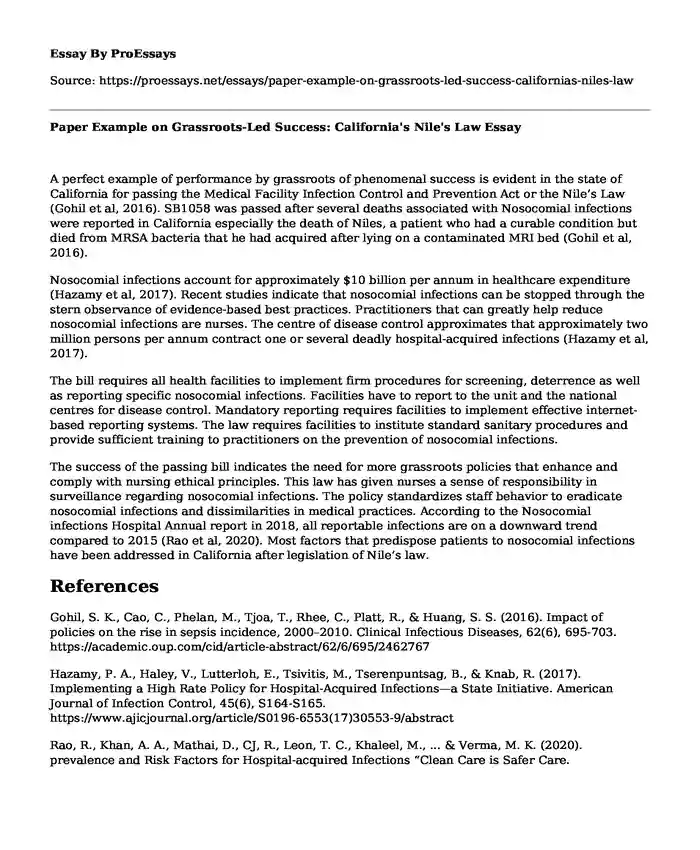A perfect example of performance by grassroots of phenomenal success is evident in the state of California for passing the Medical Facility Infection Control and Prevention Act or the Nile’s Law (Gohil et al, 2016). SB1058 was passed after several deaths associated with Nosocomial infections were reported in California especially the death of Niles, a patient who had a curable condition but died from MRSA bacteria that he had acquired after lying on a contaminated MRI bed (Gohil et al, 2016).
Nosocomial infections account for approximately $10 billion per annum in healthcare expenditure (Hazamy et al, 2017). Recent studies indicate that nosocomial infections can be stopped through the stern observance of evidence-based best practices. Practitioners that can greatly help reduce nosocomial infections are nurses. The centre of disease control approximates that approximately two million persons per annum contract one or several deadly hospital-acquired infections (Hazamy et al, 2017).
The bill requires all health facilities to implement firm procedures for screening, deterrence as well as reporting specific nosocomial infections. Facilities have to report to the unit and the national centres for disease control. Mandatory reporting requires facilities to implement effective internet-based reporting systems. The law requires facilities to institute standard sanitary procedures and provide sufficient training to practitioners on the prevention of nosocomial infections.
The success of the passing bill indicates the need for more grassroots policies that enhance and comply with nursing ethical principles. This law has given nurses a sense of responsibility in surveillance regarding nosocomial infections. The policy standardizes staff behavior to eradicate nosocomial infections and dissimilarities in medical practices. According to the Nosocomial infections Hospital Annual report in 2018, all reportable infections are on a downward trend compared to 2015 (Rao et al, 2020). Most factors that predispose patients to nosocomial infections have been addressed in California after legislation of Nile’s law.
References
Gohil, S. K., Cao, C., Phelan, M., Tjoa, T., Rhee, C., Platt, R., & Huang, S. S. (2016). Impact of policies on the rise in sepsis incidence, 2000–2010. Clinical Infectious Diseases, 62(6), 695-703. https://academic.oup.com/cid/article-abstract/62/6/695/2462767
Hazamy, P. A., Haley, V., Lutterloh, E., Tsivitis, M., Tserenpuntsag, B., & Knab, R. (2017). Implementing a High Rate Policy for Hospital-Acquired Infections—a State Initiative. American Journal of Infection Control, 45(6), S164-S165. https://www.ajicjournal.org/article/S0196-6553(17)30553-9/abstract
Rao, R., Khan, A. A., Mathai, D., CJ, R., Leon, T. C., Khaleel, M., ... & Verma, M. K. (2020). prevalence and Risk Factors for Hospital-acquired Infections “Clean Care is Safer Care.
Cite this page
Paper Example on Grassroots-Led Success: California's Nile's Law. (2023, Sep 28). Retrieved from https://proessays.net/essays/paper-example-on-grassroots-led-success-californias-niles-law
If you are the original author of this essay and no longer wish to have it published on the ProEssays website, please click below to request its removal:
- Cancer Case Study: Role and Behavior of a Patient
- Paper Example on Juvenile Sentencing
- Stress and Burnout in Nursing Essay Example
- Article Analysis Essay on The Effect of Educational Intervention on Nurses' Knowledge
- Smoking Is Affecting Your Health in a Negative Way Speech Paper Example
- Essay on 1950s United States Civil Rights Movement: Non-Violent Protests & Equal Rights
- Essay Sample on X-Ray Films: Essential for Accurate Diagnosis of Chest Problems







